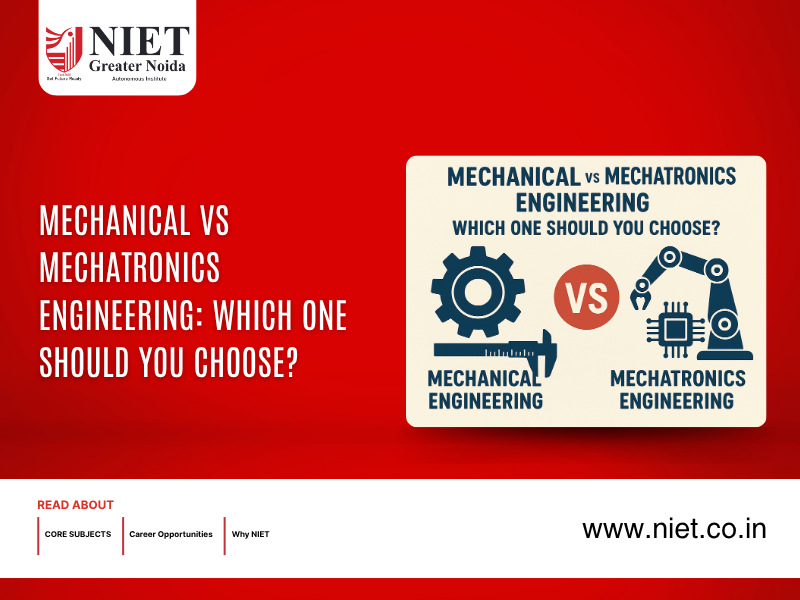Choosing the right engineering branch can be a defining decision in your academic and professional life. Among the many specializations, Mechanical and Mechatronics Engineering stand out as two dynamic fields that blend innovation, creativity, and technology. While both disciplines share a strong foundation in design and manufacturing, they differ in focus, application, and future career paths.
Understanding Mechanical Engineering
Mechanical Engineering is one of the oldest and most diverse branches of engineering. It primarily deals with the design, analysis, and manufacturing of mechanical systems. From engines and turbines to robots and automobiles, mechanical engineers are the driving force behind the world’s machinery and innovation.
Key areas of study include:
- Thermodynamics and Fluid Mechanics
- Machine Design and Manufacturing
- Robotics and Automation Basics
- Material Science and Strength of Materials
Students pursuing Mechanical Engineering gain hands-on experience in laboratories, learning to create solutions that improve efficiency and sustainability. The versatility of this branch allows graduates to work in industries such as automotive, aerospace, energy, and robotics.
Understanding Mechatronics Engineering
Mechatronics Engineering is an interdisciplinary field that merges mechanical, electrical, and computer engineering principles. It focuses on developing smart systems and intelligent machines, from autonomous robots to advanced control systems used in modern industries.
Core subjects include:
- Sensors and Actuators
- Embedded Systems
- Control Engineering
- Microprocessors and Robotics
- Artificial Intelligence in Automation
In simple terms, while Mechanical Engineering focuses on building machines, Mechatronics Engineering makes those machines intelligent. This modern specialization equips students with the skills to design and operate automated systems that power today’s industrial and digital revolutions.
Key Differences Between Mechanical and Mechatronics Engineering
| Aspect | Mechanical Engineering | Mechatronics Engineering |
|---|---|---|
| Focus Area | Design and development of mechanical systems | Integration of mechanical, electronic, and computer systems |
| Core Subjects | Mechanics, thermodynamics, materials | Robotics, automation, electronics, AI |
| Industry Demand | Traditional manufacturing, automotive, energy | Robotics, automation, smart manufacturing, IT |
| Skillset | Problem-solving, design, and fabrication | Programming, electronics, system control |
| Career Roles | Design Engineer, Production Manager, R&D Engineer | Robotics Engineer, Automation Specialist, Control Systems Engineer |
Both branches are promising, but your choice should depend on your interests. If you love designing physical machines and working with tools, Mechanical Engineering is ideal. If you’re fascinated by robotics, coding, and automation, Mechatronics Engineering is your path.
Career Opportunities and Future Scope
The job market for both Mechanical and Mechatronics Engineering graduates is vast and evolving.
- Mechanical Engineers find roles in manufacturing, power plants, transportation, and research organizations. They are also in high demand in emerging sectors like renewable energy and sustainable design.
- Mechatronics Engineers, on the other hand, are key contributors to Industry 4.0 — the age of automation and smart manufacturing. They work in robotics, AI-driven industries, defense systems, and advanced manufacturing setups.
Why Choose NIET for These Programs?
At Noida Institute of Engineering and Technology (NIET), one of the leading autonomous engineering colleges, students receive a blend of theoretical knowledge and hands-on industrial exposure. The institute offers advanced programs in both Mechanical and Mechatronics Engineering, focusing on innovation, research, and employability.
Key highlights include:
- State-of-the-art laboratories equipped for robotics, automation, and design.
- Experienced faculty from top research and industry backgrounds.
- Industry partnerships for internships and placements with leading companies.
- A project-based learning approach that nurtures creativity and critical thinking.
NIET empowers every student to transform their academic learning into real-world applications, preparing them for competitive global careers.
Conclusion
Both Mechanical and Mechatronics Engineering offer excellent career opportunities for students passionate about technology, innovation, and problem-solving. While Mechanical Engineering lays the foundation for understanding physical systems, Mechatronics Engineering takes it a step further by integrating smart technology and automation.
Choosing the right field depends on your interests, career goals, and learning style. Institutions like NIET, with their advanced curriculum and industry exposure, ensure that every student is equipped to excel in whichever path they choose.


















